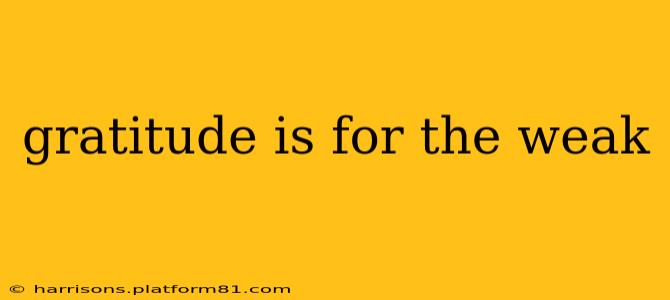Is Gratitude for the Weak? Debunking the Myth of Weakness and Gratitude
The statement "gratitude is for the weak" is a harmful misconception that needs debunking. It's a sentiment that often surfaces in competitive environments, where vulnerability is perceived as a liability. But the truth is far more nuanced and beneficial. Gratitude isn't a sign of weakness; it's a powerful tool for mental and emotional well-being, available to and beneficial for everyone, regardless of strength or perceived toughness.
This article will explore the pervasive myth surrounding gratitude and weakness, providing evidence-based arguments that challenge this misconception. We'll examine the benefits of gratitude and how it contributes to resilience and strength, ultimately demonstrating that expressing gratitude is a sign of emotional intelligence and maturity, not weakness.
What is the Origin of This Misconception?
The belief that gratitude is for the weak likely stems from societal pressures emphasizing strength, resilience, and independence. In cultures that value self-reliance above all else, expressing vulnerability, including gratitude, can be misinterpreted as a sign of dependency or weakness. This perception often originates from a misunderstanding of what gratitude truly entails.
It’s crucial to understand that expressing gratitude doesn't imply dependence. Instead, it represents a conscious choice to acknowledge and appreciate the positive aspects of life, even amidst difficulties. This acknowledgment strengthens one's emotional fortitude and resilience, rather than weakening it.
Is Showing Gratitude a Sign of Weakness? Why or Why Not?
Absolutely not. Showing gratitude is a sign of emotional maturity and strength. It takes courage to acknowledge vulnerability and appreciate the support received from others. It requires self-awareness to recognize the positive aspects of life, even in challenging circumstances. Strong individuals aren't immune to hardship; they navigate it with resilience, and gratitude plays a vital role in this process.
Consider elite athletes. They often express gratitude for their coaches, teammates, and family. This isn't a sign of weakness; it's an acknowledgment of the support network crucial to their success. Their gratitude doesn't diminish their achievements; it enhances them by highlighting the collaborative nature of success.
What are the Benefits of Practicing Gratitude?
Numerous studies demonstrate the profound benefits of cultivating gratitude. These benefits extend far beyond simple feelings of happiness; they contribute to overall well-being and resilience:
- Improved Mental Health: Gratitude combats negative emotions like anxiety and depression by shifting focus to positive aspects of life. It fosters optimism and hope, leading to a more positive outlook.
- Enhanced Physical Health: Studies suggest a correlation between gratitude and improved sleep, reduced blood pressure, and a stronger immune system. This connection highlights the mind-body connection, where positive emotions positively impact physical health.
- Increased Resilience: By focusing on what one has rather than what one lacks, gratitude builds resilience against stress and adversity. It equips individuals with a positive coping mechanism to navigate life's challenges.
- Stronger Relationships: Expressing gratitude strengthens relationships by fostering appreciation and connection. It reinforces positive interactions and enhances feelings of belonging.
How Can I Incorporate More Gratitude into My Life?
Cultivating gratitude is a practice, not a destination. It requires conscious effort and consistent application. Here are some practical steps:
- Keep a gratitude journal: Regularly write down things you are grateful for. This simple act can significantly impact your overall outlook.
- Express gratitude to others: Verbally express your appreciation to those who have helped or supported you. A simple "thank you" can make a significant difference.
- Practice mindfulness: Pay attention to the present moment and appreciate the simple pleasures of life. Savor experiences and find joy in the everyday.
- Show appreciation for yourself: Acknowledge your achievements and strengths. Self-compassion and self-gratitude are vital components of overall well-being.
In conclusion, the notion that gratitude is for the weak is a dangerous oversimplification. It's a misconception that undermines the profound benefits of practicing gratitude. Cultivating gratitude isn't a sign of weakness; it's a testament to emotional intelligence, resilience, and the ability to appreciate the good in life. Embrace gratitude—it's a powerful tool for building a happier, healthier, and more fulfilling life.
